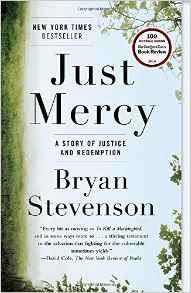 Bryan Stevenson, Just Mercy: A Story of Justice and Redemption (New York: Spiegel & Grau, 2015), 368pp.
Bryan Stevenson, Just Mercy: A Story of Justice and Redemption (New York: Spiegel & Grau, 2015), 368pp.
A guest book review by Carrie LeRoy.
This memoir by the civil rights lawyer Bryan Stevenson is a powerful and important indictment of our racially-biased and often unjust criminal justice system. Stevenson is an African-American grandson of slaves who was raised in relative poverty in Delaware, attended college, earned a law degree from Harvard Law School, and who has focused most of his legal career on representing people of color on death row. He is also the founder and Executive Director of the Equal Justice Initiative in Montgomery, Alabama, which focuses on addressing excessive and unfair sentencing, exonerating innocent death row prisoners, ending the abuse of the incarcerated and the mentally ill, and advocating on behalf of children prosecuted as adults. Stevenson is well-known in the civil rights legal community for his advocacy before the U.S. Supreme Court, winning rulings that the mandatory life-without-parole sentences for all children 17 or younger are unconstitutional, and that the death penalty is cruel and unusual punishment (and thus unconstitutional under the Eighth Amendment) when applied to children. Currently a Professor of Law at the New York University School of Law, Stevenson is also involved in high-profile public works to raise awareness of the history of lynching, slavery, and racial segregation in the United States.
Just Mercy delves deep into the experiences of incarcerated African-American and Latino-American children and, in particular, one wrongfully-convicted African-American who very narrowly avoided capital punishment. Stevenson focuses on individual cases of injustice against a backdrop of a significant increase in the mass incarceration of people of color in the United States. The prison population grew by 700% from 1970 to 2005, and the incarceration rates disproportionately impact men of color: 1 in every 15 African American men and 1 in every 36 Hispanic men are incarcerated in comparison to 1 in every 106 white men. An African American male born in 2001 has a one in three chance of serving time in prison in his lifetime.*
Stevenson brings these kinds of statistics to life by exploring the often devastating factors that lead to criminal conduct and the disparate impact of the criminal justice system on people of color. He argues that "the opposite of poverty is not wealth, but justice." Stevenson bears witness to the repeated administration of injustice against minorities, none of whom has the means to hire the kind of criminal defense teams that are typically reserved for the wealthy in this country.
Stevenson successfully advocates for many of his clients, but his victories are somewhat muted — not so much celebratory moments as moments of reflection: an African-American client held on death row for a crime that he did not commit is released, but what is the victory in narrowly escaping oppression, and in this man's case losing six years of his life to death row? How many innocent people are sitting on death row today as a result of racial bias and just not enough mercy (or money)? Stevenson invites his readers to consider the underpinnings of a criminal justice system that produce time and time again unjust outcomes for people of color.
Black Lives Matter. It needs to be repeated again and again like a mantra for those of us who have never had the experience of being stopped or assaulted by the police on the basis of our skin color — or, worse, lost an innocent brother, father or son to police brutality and misconduct. Just Mercy highlights the evidence that our criminal justice is built on pillars of racial bias and asks us to question and protest the implicit assumption underlying the disproportionate condemnation of people of color that they do not matter. The poor, the vulnerable, the marginalized, and the mentally ill all need mercy and the colorblind, equal administration of justice. Stevenson contends that "the true measure of our character is how we treat the poor, the disfavored, the accused, the incarcerated, and the condemned." He confronts us with the reality that, as a nation, we have largely given up on the condemned — the hope of rehabilitation has given way to a punitive approach and narrative that favors harsh punishment, retribution, and letting fear dictate policy. Just Mercy suggests that the result is extreme, institutionalized racial injustice.
Just Mercy, however, is more than a chronicle of injustice — it also explores the possibility of redemption. If we are feeling stuck in a divisive place and time where all we can see are our differences, Stevenson reminds us that “there is no wholeness outside of our reciprocal humanity.” That means seeing the humanity of the individual oppressor as well (who is often a product of an oppressive system or social order) and never giving up hope for a change of heart, a shift from condemnation, anger and judgment to mercy — persistent hope for ourselves and each other. Just Mercy provides its readers with both important questions and answers to help us to recognize and strive to end racial injustice and to believe that, as divided and different as we may appear, we may all find wholeness through understanding, or attempting to understand, the sources of pain and injury from which divisions arise and injustice is born.
Note: For a feature-length article on Bryan Stevenson and his work, see Jeffrey Toobin, "The Legacy of Lynching, On Death Row" (The New Yorker, August 22, 2016).
*See "8 Facts You Should Know About the Criminal Justice System and People of Color" by the Center for American Progress.


